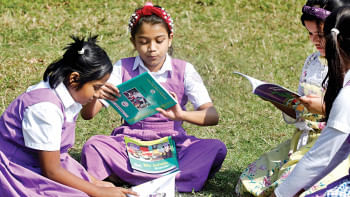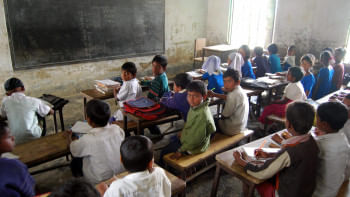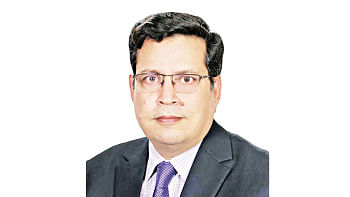The education mission for the interim government

In 1974, Dr Muhammad Qudrat-i-Khuda, head of Bangladesh's first education commission, outlined many goals for the country's education sector, from universal literacy at the primary stage to quality education in Bangladesh universities. These goals were never realised. A majority of children aged 10-14 years cannot read or count at a basic level, according to World Bank estimates, and adult literacy skills at functional level remain well below 40 percent, according to an Education Watch assessment.
The expectations from the interim government, headed by Prof Muhammad Yunus, are many and high. The burning education questions are the policy and action priorities for the interim government.
To the credit of the Awami League government, the 2010 National Education Policy, adopted by the parliament, was a broadly accepted guideline for development in education. However, 14 years later, we have not seen a comprehensive and coordinated implementation plan for the policy. Most key objectives remain unmet, such as: i) a core unified curriculum for all types of school education with a minimum common standard of school provisions for all students; ii) major change in the professional training of teachers, their performance standards, their status and incentives, and assurance of adequate numbers; and iii) decentralised and accountable education governance, planning and management. These goals were aimed at realising an inclusive and equitable education system that responds to the needs of changing times.
Many educationists saw education development as fragmented and partial. The government actions did not address the roots of the problems. Too often, the government pursued solutions that avoided rocking the boat—solutions that usually don't work.
Public investment in education has remained at or below two percent of GDP—one of the lowest among developing countries. And larger budgets, under the present structure of planning, management and accountability, may lead to more waste, inefficiency, and mismanagement. One of the priorities should be a broad assessment of primary-level students' ability to read and do basic arithmetic, and actions based on the assessment to reach these targets. For example, Bangladesh could adopt the early grade reading and arithmetic survey, Annual Status of Education Report (ASER). It was pioneered by Pratham, an Indian NGO.
The past government claimed credit for a major expansion of student enrolment including girls, growth in the number of educational institutions, stipends for school students, distribution of free textbooks, and use of multimedia in classrooms. These have not produced satisfactory learning outcomes due to deficits in planning, school management, accountability, and pursuit of an education vision. We don't have enough teachers with professional skills, commitment to teaching, and a career path for them.
Comprehensive and coordinated planning has been obstructed by splitting school education into two ministries, unlike in any other country. As in other sectors, partisan political interests, rather than educational goals, have guided decision-making, especially in recruitment of personnel.
The new school education curriculum, launched in 2022 with much fanfare, has caused much anxiety and confusion among students, teachers, and parents.
The extraordinary recent events call for urgent actions. Students need to be in school and normal operations need to resume. At the university level, the University Grants Commission (UGC), in consultation with students and other stakeholders, should provide guidelines, but not seek to micro-manage. Each institution should consult students and teachers, and parents at school level, in implementing the guidelines.
With their sacrifice and maturity demonstrated in the popular movement, students have earned the right to have a role in managing the education and co-curricular activities of their institutions. Non-partisan elected student bodies should be formed in institutions.
The recent spate of resignations in top university positions requires that the right people be appointed to the right place. Appointments must be based on merit, not political loyalty. The process must ensure impartiality through measures such as clearly defined qualifications and use of search committees. A professional UGC can facilitate the process and consult teachers and students.
While changes are made, schools must continue to operate without disruptions and untried experimentations. This is particularly germane to the new curriculum. Most educationists want a pause in the rollout of the new curriculum. In order to minimise disruption, two steps can be taken: i) textbooks already introduced in some grades under the new curriculum may continue and existing textbooks may be used for other grades; and ii) conventional end-of-year or public student evaluation based on written examinations should continue, separating formative and practical work-based evaluation in classrooms from summative written examinations. Pausing for a year or so should be used to review and rethink the curricular reforms, particularly student evaluation, a highly controversial aspect of the new curriculum, and effective implementation in classrooms. Experts and stakeholders should be involved in this rethink.
An education consultative group of experts and stakeholders should examine the status and the priorities in the education sector and advise the interim government. They would look at the issues and suggest actions on the matters noted above. This group may be turned into a permanent, statutory commission as recommended in the 2010 education policy.
The consultative group would also consider and advise on larger policy questions related to the Sustainable Development Goals and national goals for building an equitable, inclusive and quality education system for all. These larger agenda would include: i) promoting an equitable society through education; ii) a time-bound plan for equitable and inclusive early childhood development and K-12 school education of acceptable quality for all; iii) strengthening the teaching profession and the education workforce in respect of their professional skills, motivation, performance and adequacy of numbers as well as effective use of digital technologies; iv) establishing decentralised district education authorities for planning and managing equitable K-12 education in every community; and v) ensuring academic autonomy of the education system and education institutions, protecting them from partisan politics.
The interim government may not complete all needed reforms. It should at least set a course which all stakeholders can endorse. If the interim government realises at least some of the key reforms, we will have honoured Dr Qudrat-i-Khuda's aspirations.
The author acknowledges valuable comments received from Dr John Richards and Shahidul Islam, his co-authors of the book 'Political Economy of Education in South Asia: Fighting Poverty, Inequality and Exclusion' (University of Toronto Press, 2022).
Dr Manzoor Ahmed is professor emeritus at BRAC University, chair of Bangladesh ECD Network (BEN), and adviser to the Campaign for Popular Education (CAMPE).
Views expressed in this article are the author's own.
Follow The Daily Star Opinion on Facebook for the latest opinions, commentaries and analyses by experts and professionals. To contribute your article or letter to The Daily Star Opinion, see our guidelines for submission.

 For all latest news, follow The Daily Star's Google News channel.
For all latest news, follow The Daily Star's Google News channel. 











Comments